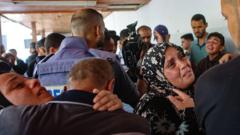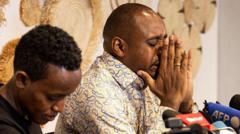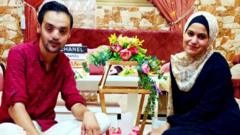In a surprising turn of events, the Democratic Republic of Congo (DRC) government has enforced a media ban barring any reporting on former President Joseph Kabila's activities, coinciding with his recent return to the nation after a two-year absence. The ban prohibits media from conducting interviews with Kabila's party members and aims to prosecute him based on allegations of treason connected to the M23 rebel group. This action has sparked backlash from political commentators and human rights activists, who view it as a suppression of free speech and an abuse of governmental power. Kabila's return marks a crucial moment in DRC's political landscape, especially following his criticisms of the current administration led by President Félix Tshisekedi.
DR Congo Media Ban on Reporting Ex-President Kabila's Activities

DR Congo Media Ban on Reporting Ex-President Kabila's Activities
The government restricts coverage amidst rising tensions and accusations against former president.
The Congolese government has recently prohibited media from reporting on former President Joseph Kabila and interviewing his party's members. This measure follows Kabila's return to the DRC last month after a two-year self-imposed exile, escalating tensions with the current government under President Félix Tshisekedi. The government is pursuing treason charges against Kabila over alleged connections with the M23 rebel group, which he has denied. Violations of this ban may lead to suspensions of media outlets, according to the country's media regulator. Political analysts have warned that the ban might fuel public curiosity about Kabila, as his party continues to post updates online regarding his activities, including engagements with civil society in Goma.
Despite the government ban, M23 representatives indicated they would disregard the restrictions on their territories. Kabila's party secretary criticized the ban as "arbitrary" and a violation of free expression. Activists have decried the ban as an abuse of power, further complicating an already tense political environment marked by allegations of foreign intervention and internal strife in the DRC.
Despite the government ban, M23 representatives indicated they would disregard the restrictions on their territories. Kabila's party secretary criticized the ban as "arbitrary" and a violation of free expression. Activists have decried the ban as an abuse of power, further complicating an already tense political environment marked by allegations of foreign intervention and internal strife in the DRC.



















